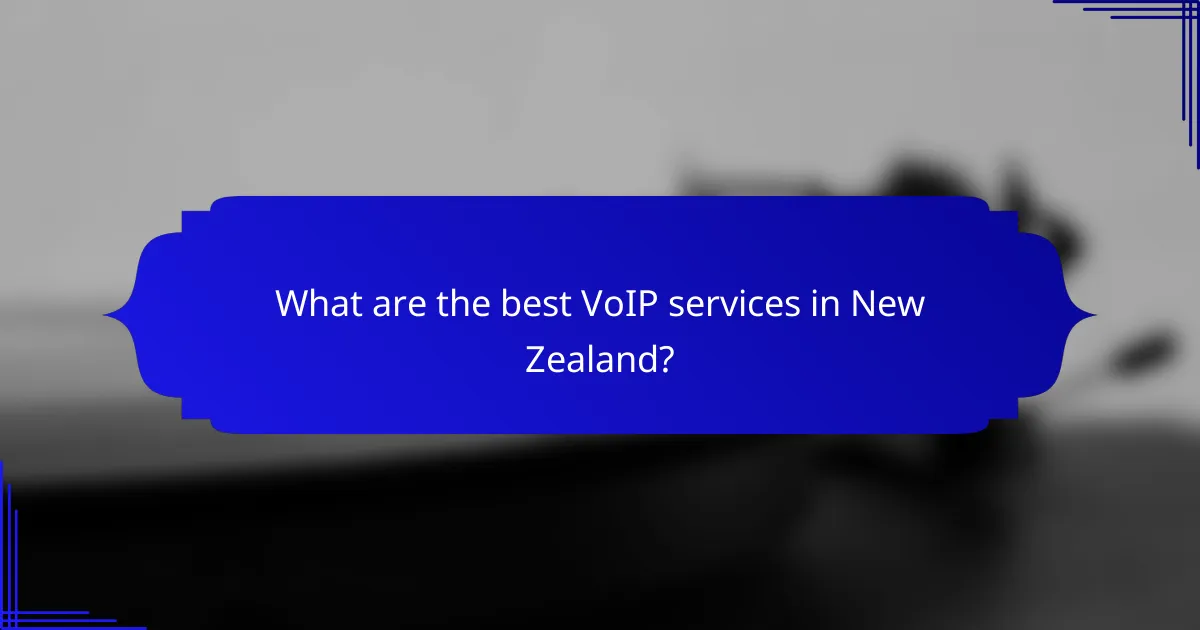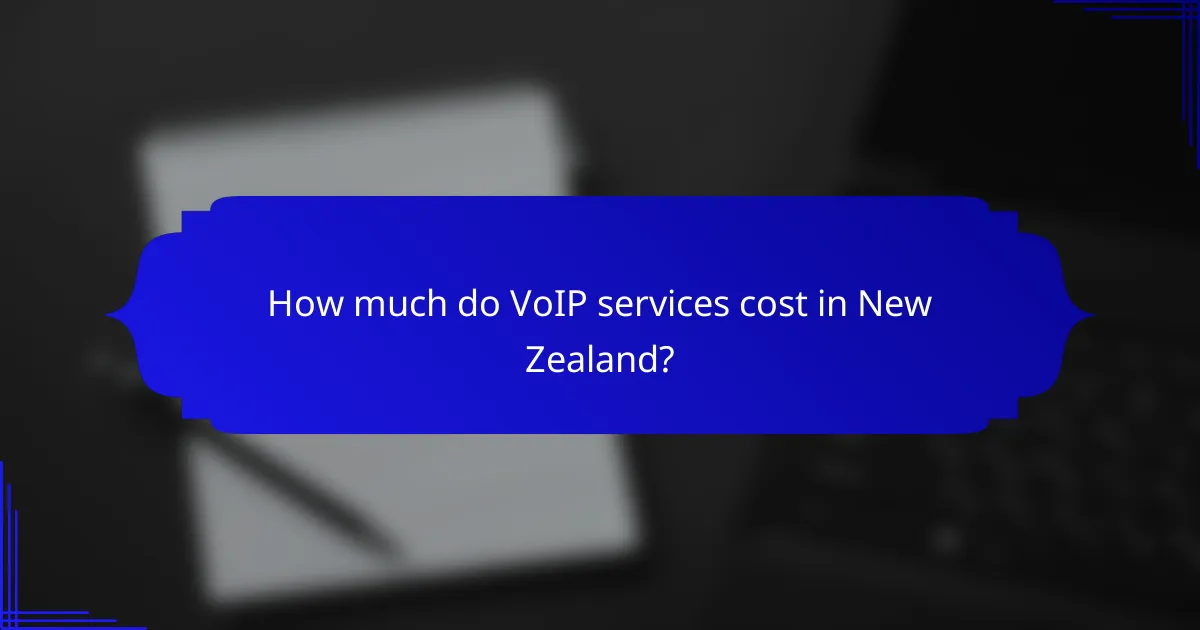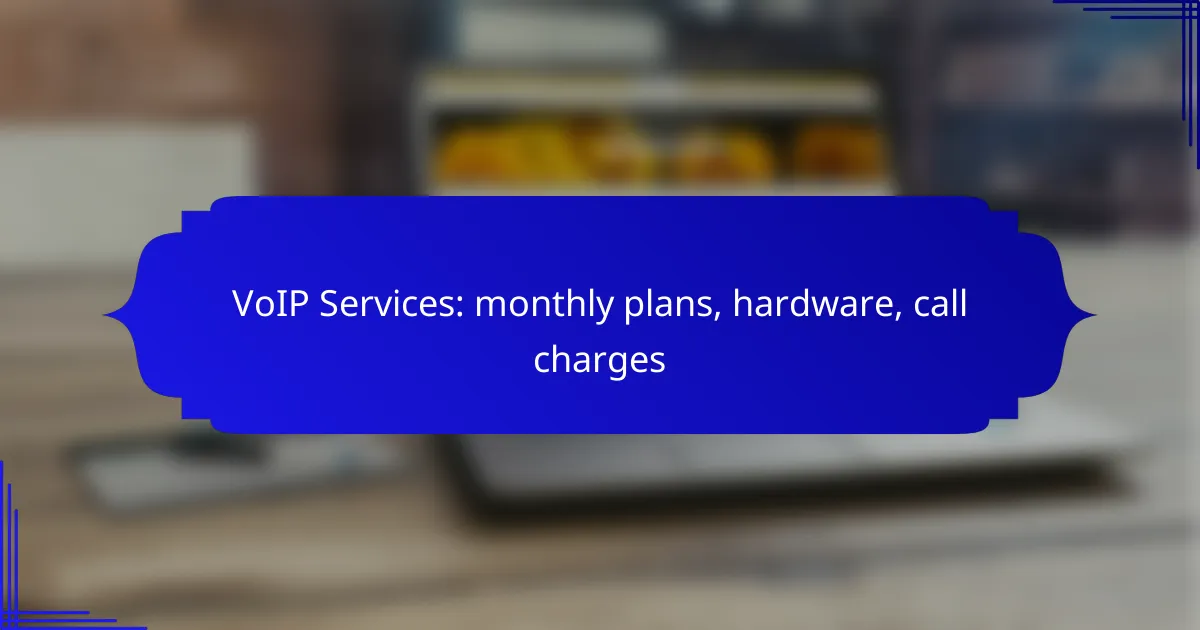VoIP services in New Zealand provide a variety of monthly plans, hardware options, and call charges designed to meet diverse user needs. With providers like Vocus, 2Talk, and Slingshot, customers can choose from plans that typically range from NZD 10 to NZD 50 per month, along with additional charges for international calls. To make the most of these services, users will need specific hardware such as VoIP phones and compatible routers to ensure optimal communication quality.

What are the best VoIP services in New Zealand?
The best VoIP services in New Zealand offer a range of monthly plans, hardware options, and call charges tailored to different needs. Key providers include Vocus, 2Talk, and Slingshot, each with unique features and pricing structures that cater to residential and business users.
Vocus VoIP plans
Vocus provides several VoIP plans suitable for both home and business users. Their offerings typically include unlimited local and national calls, with plans starting at around NZD 20 per month. Additional features such as call waiting, voicemail, and caller ID are often included.
When choosing a Vocus plan, consider your calling habits. If you frequently call mobile numbers or international destinations, look for plans that offer competitive rates for those services. Vocus also provides hardware options, including VoIP phones and adapters, to ensure seamless connectivity.
2Talk VoIP solutions
2Talk specializes in flexible VoIP solutions, allowing users to customize their plans based on specific needs. Their pricing starts from approximately NZD 10 per month for basic services, with options to add features like call recording and conferencing for an extra fee.
2Talk is particularly appealing for small businesses due to its scalability and range of business-focused features. Users should evaluate the total cost of ownership, including hardware and additional features, to find the best fit for their requirements.
Slingshot VoIP offerings
Slingshot offers competitive VoIP services that cater primarily to residential customers. Their plans usually start at around NZD 25 per month, including unlimited local calls and affordable rates for national and international calls. Slingshot also provides a range of compatible hardware options.
When selecting a Slingshot VoIP plan, consider the overall value, including call rates and included features. Their customer support is noted for being responsive, which can be a significant advantage for users who may need assistance with setup or troubleshooting.

How much do VoIP services cost in New Zealand?
VoIP services in New Zealand typically range from low monthly fees to variable call charges, depending on the provider and plan chosen. Users can expect to pay anywhere from NZD 10 to NZD 50 per month, with additional costs for international calls.
Monthly plan pricing
Monthly plans for VoIP services in New Zealand vary widely based on features and included minutes. Basic plans often start around NZD 10, offering limited local calls, while more comprehensive packages can reach up to NZD 50, including unlimited national calls and additional features like voicemail and call forwarding.
When selecting a plan, consider your calling habits. If you make frequent international calls, look for plans that offer competitive rates or bundled international minutes to avoid high costs.
Call charges breakdown
Call charges for VoIP services can differ significantly based on the destination and the provider. Local calls are generally included in monthly plans, while national calls might incur charges ranging from NZD 0.05 to NZD 0.15 per minute.
International call rates can vary widely, with some providers offering competitive rates for popular destinations. Always check the specific rates for the countries you frequently call to avoid unexpected charges.
Comparative cost analysis
When comparing VoIP services, it’s essential to evaluate both monthly fees and call charges. Some providers may offer lower monthly rates but higher per-minute charges, while others might have a higher upfront cost but more inclusive calling options.
To make an informed decision, create a simple table comparing the monthly fees, included minutes, and call rates for your most common destinations across different providers. This will help you identify the best value for your specific needs.

What hardware is needed for VoIP services?
To use VoIP services effectively, you need specific hardware that ensures clear communication and reliable connectivity. Essential components include VoIP phones, compatible routers, and VoIP adapters or gateways, which work together to facilitate voice calls over the internet.
Recommended VoIP phones
When selecting VoIP phones, consider models that support the SIP (Session Initiation Protocol) standard for compatibility with most VoIP services. Popular options include brands like Cisco, Polycom, and Yealink, which offer a range of features from basic functionality to advanced capabilities like video calling and programmable keys.
For home use, entry-level models can cost around $50 to $100, while business-grade phones may range from $150 to $500, depending on features. Look for phones with good sound quality, ease of use, and warranty support.
Compatible routers for VoIP
A router that supports Quality of Service (QoS) is crucial for optimizing VoIP calls. QoS prioritizes voice traffic over other types of data, reducing latency and ensuring clearer calls. Brands like Netgear, TP-Link, and Asus offer routers designed with VoIP in mind.
When choosing a router, consider models that provide dual-band capabilities and at least 1 Gbps throughput. Prices typically range from $50 to $300. Ensure the router has the latest firmware to maintain security and performance.
VoIP adapters and gateways
VoIP adapters and gateways are essential for connecting traditional telephones to VoIP networks. These devices convert analog signals into digital data, allowing standard phones to make calls over the internet. Popular options include the Cisco SPA112 and Ooma Telo.
When selecting an adapter, check for compatibility with your VoIP service provider and features like built-in routers or additional ports for multiple devices. Prices for VoIP adapters generally range from $30 to $100, making them an affordable option for integrating existing phone systems with VoIP technology.

What are the features of VoIP services?
VoIP services offer a range of features that enhance communication, including call forwarding, voicemail, and conference calling. These functionalities can significantly improve both personal and business interactions by providing flexibility and efficiency.
Call forwarding options
Call forwarding in VoIP services allows users to redirect incoming calls to another number, ensuring that important calls are not missed. This feature can be set up to forward calls to mobile phones, landlines, or even other VoIP numbers.
Common options include unconditional forwarding, which sends all calls to another number, and conditional forwarding, which only activates when the line is busy or unanswered. Users should consider their needs and choose a plan that offers the most suitable forwarding options.
Voicemail capabilities
VoIP voicemail systems typically provide advanced features compared to traditional voicemail, such as email notifications and voicemail-to-email transcription. This allows users to receive and read their messages conveniently without needing to dial in.
Many VoIP providers offer customizable voicemail greetings and the ability to manage messages through a web portal or mobile app. It’s essential to check the specific voicemail features included in your VoIP plan to ensure they meet your requirements.
Conference calling features
Conference calling is a vital feature for businesses that need to connect multiple participants in a single call. VoIP services often support high-quality audio and video conferencing, allowing for seamless communication among teams, regardless of location.
Some VoIP providers include features like screen sharing, call recording, and integration with collaboration tools. When selecting a provider, consider the maximum number of participants allowed and any additional functionalities that may enhance your conferencing experience.

How to choose the right VoIP service?
Choosing the right VoIP service involves evaluating your specific communication needs, budget, and desired features. Consider factors such as call quality, pricing structures, and customer support to find a service that aligns with your requirements.
Key selection criteria
When selecting a VoIP service, prioritize call quality, reliability, and the range of features offered. Look for services that provide HD voice clarity and minimal latency, ideally under 20 ms for optimal performance. Additionally, consider whether the service includes essential features like voicemail, call forwarding, and conferencing.
Pricing is another critical factor. Monthly plans can vary widely, typically ranging from $10 to $50 per user, depending on the features included. Evaluate whether the plan fits your budget while still meeting your communication needs.
Customer support evaluation
Assessing customer support is vital when choosing a VoIP provider. Look for services that offer 24/7 support through multiple channels, such as phone, chat, and email. Quick response times and knowledgeable staff can significantly impact your experience, especially during technical issues.
Additionally, consider the availability of online resources like FAQs, tutorials, and community forums. A provider with comprehensive self-help options can save you time and enhance your understanding of the service.

What are the advantages of VoIP over traditional phone services?
VoIP, or Voice over Internet Protocol, offers several advantages over traditional phone services, primarily in cost, flexibility, and features. Users can enjoy lower call rates, especially for long-distance calls, and access to advanced functionalities that enhance communication.
Cost savings benefits
One of the main cost-saving benefits of VoIP is reduced monthly fees compared to traditional landlines. Many VoIP providers offer plans that can be significantly cheaper, often in the range of $20 to $50 per month, depending on the features included.
Additionally, VoIP services typically have lower call charges, especially for international calls, which can be a fraction of traditional rates. This can lead to substantial savings for businesses and individuals who frequently make long-distance calls.
Flexibility and scalability
VoIP systems are highly flexible, allowing users to make and receive calls from various devices, including smartphones, tablets, and computers. This flexibility means you can stay connected regardless of your location, as long as you have internet access.
Scalability is another key advantage; businesses can easily add or remove lines and features as needed without the hassle of physical installations. This adaptability is particularly beneficial for growing companies, allowing them to adjust their communication needs without significant upfront costs.
